feature image of Favianna Rodriguez via urbanhabitat.org
Immigration issues are claiming space at the forefront of the U.S. political stage. While plans for Comprehensive Immigration Reform have festered in the House and Senate, a growing grassroots movement for immigrant justice has also carved out its own space, calling for a halt to deportations and the dismantling of the U.S. Border Patrol and immigrant detention systems.
Many young activists are leading the charge for immigrant justice. As they come out for immigrant justice, many are also coming out as queer. The “I Am UndocuQueer” campaign by Julio Salgado helped highlight the lives and experiences of queer undocumented people in the U.S. Earlier this year we profiled Lulú Martinez, a queer undocumented activist who was part of the Dream 9. The Dream 9 are a group of undocumented students who publicly crossed from Mexico back into the U.S., subjecting themselves to immigration detention and deportation proceedings, to draw attention to how families and lives are torn apart by unjust immigration policies. The Dream 30 followed them in September.
Here are four more queer women immigration activist leaders, all working in different ways to organize for justice around the U.S.:
Prerna Lal
@prernaplal
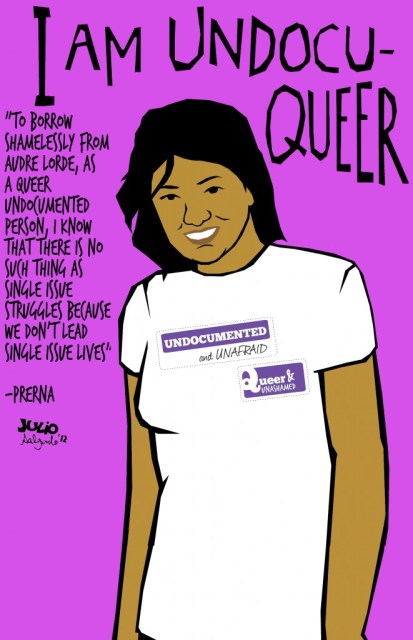
“Queer undocumented youth leaders have recently used the increasing visibility of their existence to break down the silos of mainstream LGBT and immigration reform work…. The ongoing success of intersectional work for queer and immigrant rights has fueled calls from both funders and organizations for LGBT and immigrant rights communities to work together. We are not only better together, but we lead multidimensional lives that are affected by both anti-immigrant and heterosexist power structures.”
Lal has written widely on the immigrant justice movement’s connection to LGBTQ issues. With her law degree, she writes on the impacts of immigration law.
Favianna Rodriguez
@favianna
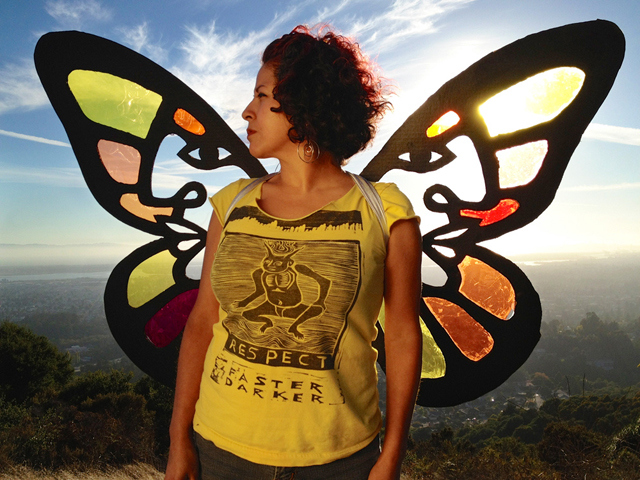
![via [presente.org]](https://develop.autostraddle.com/wp-content/uploads/2013/12/MIB_Favianna.jpg?resize=640%2C480)
“…politically engaged artwork surrounded me, and I knew that posters could educate the community. As the daughter of migrants, I’ve always been politically conscious. I began organizing when I was 15. Organizing requires getting the word out and exposing important issues. It just came together naturally, using my artwork to be involved and express myself made the most sense.”
Much of Rodriguez’s work specifically references different movements and organizations, from May Day to International Women’s Day.
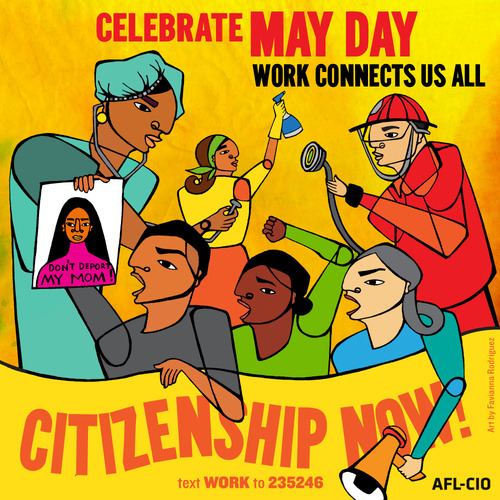
@YCarrillo4
In 2010, Carrillo occupied Senator John McCain’s office in Tucson, AZ, in what is understood to be the first act of civil disobedience by undocumented activists. Carrillo was arrested, and faced deportation hearings. Carrillo came to the U.S. from Guerrero, Mexico with her mother when she was eight. Her story has been circulated widely as part of the “DREAM Now Series: Letters to Barack Obama,” a campaign calling President Obama to push for the DREAM Act, which creates pathways to citizenship for undocumented people who came to the U.S. as children. In her letter, she wrote,
“I’ve had people tell me that it’s not a big deal, that I should keep on waiting for the DREAM Act to pass. My life has been on pause, rewind or replay for years. Waiting is not an option. That is why undocumented youth like myself are risking everything, right now, to pass the DREAM Act, this year. If we’re putting our lives on the line for this, Mr. President, the least you can do is call members of Congress and ask them to do the same.”
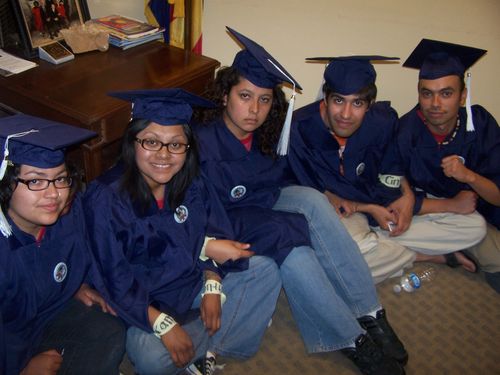
Tania Unzueta
@_LaTania
Unzueta sat in with Carrillo at Senator McCain’s office in 2010, and she has been organizing since 2001, when she was scheduled to testify in front of Congress to advocate for the DREAM Act until 9/11 pushed off the hearings. Unzueta is a co-founder of the Immigrant Youth Justice League (IYJL) and organizer with the National Day Laborer Organizing Network (NDLON). She is a queer undocumented activist, born in Mexico City, now living in Chicago. Unzueta has coordinated media for immigration activism across the U.S., including the No Papers No Fear Ride for Justice on the Undocubus across the Southern U.S. She has been at the center of campaings to change the mainstream media coverage of immigration issues, successfully lobbying the Associated Press and other media outlets to officially drop the use of “illegal” when describing undocumented people.
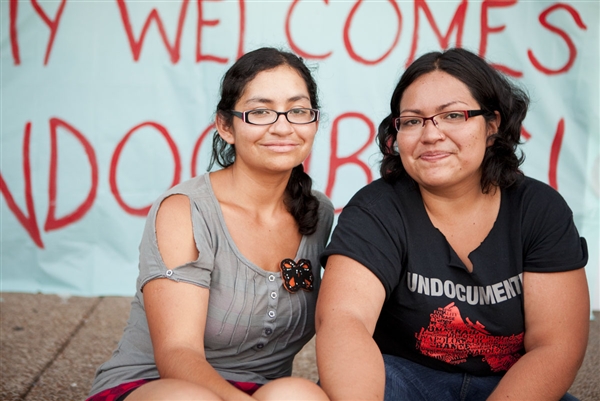
“I feel like we have to go into a deeper conversation and ask ourselves, does someone who is a legitimate criminal, whatever that means, deserve to get deported? Even in the migrant rights community. Our response has been as a national immigrant rights movement, to say, ‘We’re not criminals,’ instead of to question even the categories of criminality, and if that’s the best way to keep our communities safe.”
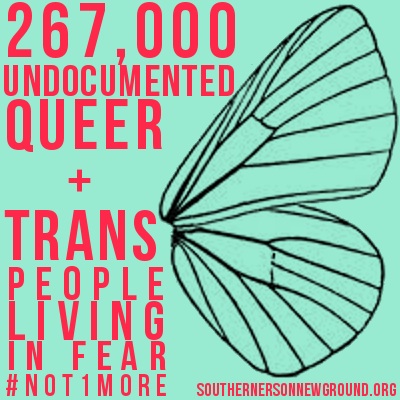








Comments
These women are amazing.
so wonderful.
and the image of Favianna Rodriguez with the butterfly wings is STUNNING.
Wonderful piece and wonderful picture
I don’t want anyone treated horribly, but I still cannot codone illegal entry into a country that has laws and rules. What about the thousands of people who come to this country the right way? Spend years to get naturalized. Again , yes the immigration process takes way too long and is very complicated and should be reformed but that does not mean people should break laws. (Please do not bring up the First Nation’s people and how the English forced their way onto this continent. I don’t agree with it and I am not proud. That does not add to the current situation)
I feel like you’re not hearing anything. And yeah, I’m going to bring Native stuff into this because I’m Native and it applies so, you know.
Let’s take a very common conservative argument against immigration reform: If we let more people come into this country, they’ll take all the land and the jobs and whatever else from the (white, conservative) Americans and what a tragedy that would be. Ok, so, first of all: most brown, poor immigrants I know, including members of my family, are working (wicked hard) for less than minimum wage and are living in horrible conditions because that’s better than it was in Jamaica and Mexico. Jobs and living conditions that the aforementioned Americans wouldn’t let themselves deal with ever. The US’s immigration policies have always, always been racist and xenophobic and absolutely only benefit the whitest and the richest. It is nearly impossible to benefit from them if you’ve got the wrong ethnic background and financial profile.
And your being in the US right now, your very existence here, is taking money and jobs and land and rights and education and health and space away from Native people. I mean, most Native people are still on reservations and I realize you don’t know what it’s like to live on a reservation but it sucks. It’s a slum. Pine Ridge is one of the poorest communities in America. The US government makes it very very hard to succeed when you are Native and especially when you are living on a reservation.
So, no. You absolutely cannot decide that even though YOUR ancestors did worse than what immigrants are doing right now that they can’t. Because you don’t have that right and all of the arguments are just plain inaccurate and problematic and racist and xenophobic and all of those lovely things.
tl;dr : walk a mile in another person’s shoes and all that jazz and also you’re living here illegally too so sorry bro
So it’s really important to understand that the idea of “borders” and the rules and laws that create them are very new. They use and perpetuate racism and xenophobia in order to criminalize, marginalize, and exploit people. Undocumented people are not lazy or impatient with the system – the system is designed to exclude them.
If you want to learn more about this, I’d encourage you to look at the work of these activists! Unzueta’s interview in Truth-Out might be particularly useful.
Solid work on my part, not linking this into the appropriate comment thread. This is meant to add to the thread with Ria and Yaykaas.
All of these folks are doing such important work! And most are so young too, I love that!!